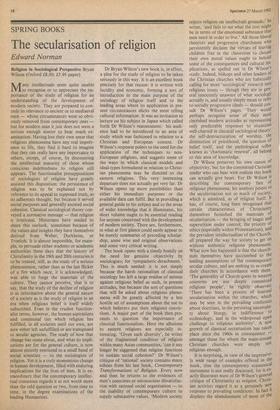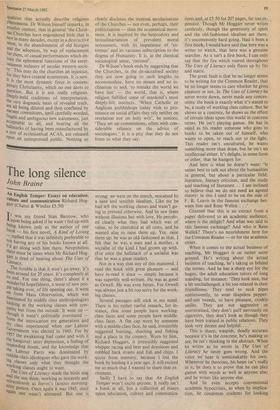SPRING BOOKS
The secularisation of religion
Edward Norman
Many intellectuals seem quite unable to recognise or to appreciate the im- portance of the study of religion for an understanding of the development of modern society. They are prepared to con- cede its relevance to ancient or to mediaeval men — whose circumstances were so obvi- ously removed from contemporary ones — but for modern man it just does not seem a serious enough matter to bear much ex- amination. Having lost their own sense that religious phenomena have any real import- ance to life, they find it hard to imagine that they can really have any importance to others, except, of course, by discounting the intellectual maturity of those whose conscious indebtedness to religion still appears. The functionalist presuppositions of sociologists of religion have greatly assisted this disposition: the persistence of religion was to be explained not by reference to its appeal to supposed truth, as its adherents thought, but because it served social purposes and generally assisted social cohesion. Classical sociological theory con- veyed a normative message — that religion is irrational. Historians have tended to share this outlook, sometimes because of the values and insights they have themselves derived from Weber, Durkheim, or Troeltsh. It is almost impossible, for exam- ple, to persuade either students or academic authorities these days that the history of Christianity in the 19th and 20th centuries is to be treated, still, as the study of a serious phenomenon, rather than as the last flicker of a fire which once, it is acknowledged, was able to forge the materials of the culture. They cannot perceive, that is to say, that the study of the decline of religion is as informative about the general nature of a society as is the study of religion in an era when religious belief is itself widely subscribed. Even in the crudest function- alist terms, however, the human aspirations and communal ties which religion has fulfilled, in all societies until our own, are now either left unfulfilled or are transposed to secular agencies. The study of how that change has come about, and what its impli- cations are for the general culture, is now almost entirely restricted to a small band of social scientists — to the sociologists of religion. Yet it is a truly momentous change in human development, filled with enduring implications for the lives of men. It is ex- traordinary that the contemporary intellec- tual consensus regards it as not worth more than the odd question or two, from time to time, in the degree examinations of the leading Humanities. Dr Bryan Wilson's new book is, in effect, a plea for the study of religion to be taken seriously in this way. It is an excellent book precisely for that reason: it is written with lucidity and economy, forming a sort of introduction to the main purpose of the sociology of religion itself and to the leading areas where its application in pre- sent circumstances elicits the most telling cultural information. It was an invitation to lecture on his subject in Japan which called forth Dr Wilson's reassessment: his audi- ence had to be introduced to an area of study which was fashioned in relation to a Christian and European context. Dr Wilson's response points to the need for the application of the techniques to non- European religions, and suggests some of the ways in which classical models and ideal-types formulated in relation to Christ- ian phenomena may be directed to the eastern religions. This very interesting departure does not actually get very far. Dr Wilson opens up more possibilities than either his immediate purposes or the available data can fulfil. But in providing a general guide to his subject and to the areas of wider knowledge that it illuminates, his short volume ought to be essential reading for anyone concerned with the development of modern society. There are, furthermore, in what at first glance could easily appear to be merely summaries of preceding scholar- ship, some wise and original observations and some very critical writing.
The book opens with a timely homily on the need for genuine objectivity by sociologists; for 'sympathetic detachment.' This is much needed: it is not simply because the harsh rationalism of classical sociology has left a large residue of animus against religious belief as such, in present attitudes, but because the sort of questions that will be asked about religious pheno- mena will be greatly affected by a less hostile set of assumptions about the use to which believers put their religious convic- tions. A major part of the book then pro- ceeds to question the importance of classical functionalism. Here the allusions to eastern religions are especially in- teresting. 'Given such diversity', he writes of the fragmented condition of religion within many Asian communities, 'can it any longer be suggested that religion functions to sustain social cohesion?' Dr Wilson's critique of 'rational' society contains many echoes from his last book, Contemporary Transformations of Religion. Every now and then he returns to the evidences of men's conscious or unconscious dissatisfac- tion with rational social organisation — to the inability of contemporary culture to supply substantive values. 'Modern society rejects religion on intellectual grounds,' he writes, 'and fails to see what the cost might be in terms of the emotional substance that men need in order to live.' All those liberal theorists and progressive churchmen who persistently declaim the virtues of leaving children free in the classroom to choose their own moral values ought to behold some of the consequences and cultural im- plications, as spelled out in Dr Wilson's study. Indeed, bishops and other leaders of the Christian churches who are habitually calling for more 'sociological' research into religious issues — though they are in gen- eral innocently unaware of what sociologY actually is, and usually simply mean to refer to socially progressive ideals — should con- sult Dr Wilson's pages. They would perhaps recognise some of their most cherished modern attitudes as representing only predictable responses to situations well-charted in classical sociological theory the self-destructuration of worship, the diminution of priesthood, the question of belief itself, and the pathological reflex known as 'charismatic renewal', all belong to this area of knowledge. Dr Wilson preserves his own canon of objectivity, but for the committed Christian reader who can bear with realism this book can actually give heart. For Dr Wilson Is describing the contemporary fate of religious phenomena; his analysis points to the secularisation not so much of society, which is admitted, as of religion itself. It has, of course, long been recognised that certain characteristics of Christianity themselves furnished the materials of secularisation — the bringing of magic and superstition under control, the priority of ethics (especially within Protestantism), and the prevalent intellectualism of the Church, all prepared the way for society to get on without authentic religious phenomena•. What now has happened is that the church- men themselves have succumbed to the leading assumptions of the contemporary secular culture, and are seeking to re-create their churches in accordance with them• `The generality of Church-goers in western countries are not deeply committed religious people', he rightly observes; `There has been a process of internal secularisation within the churches, which may be seen in the prevailing confusion about doctrines, in the persisting uncertain- ty about liturgy, in indifference to ecclesiology, and in the widespread open challenge to religious authority'. A new growth of classical sectarianism has taken place since the 1960s in consequence amongst those for whom the main-stream Christian churches were simply not religious enough.
It is surprising, in view of the impressive- ly wide range of examples offered in the book, that the contemporary ecumenical movement is not really discussed, for it ex- actly illustrates most of Dr Wilson's general critique of Christianity as religion. Christ- ian activists regard it as a genuinely new response to prevailing conditions. In fact it displays the abandonment of most of the qualities that actually describe religious Phenomena. Dr Wilson himself remarks, in another context, that in general 'the Christ- Ian Churchps have engendered little that is new in many decades, except in a destructive sense, in the abandonment of old liturgies and the adoption, by way of replacement for them, of casual performances which im- itate the ephemeral functions of the enter- tainment industry of secular western socie- ty.' This may do the churches an injustice, for they have created ecumenism. It is new. It Is the most dynamic force. in contem- Porary Christianity, which no one dares to question. But it is not really religious. DeePIY-held traditions of interpretation, the very dogmatic basis of revealed truth, are all being diluted and then conflated by earnest committees, until carefully-worded, fragile and ambiguous new statements, just hallmarks of having been manufactured by a son of ecclesiastical ACAS, are released upon an unimpressed public. Nothing so
clearly discloses the internal secularisation of the Churches — not even, perhaps, their politicisation — than the ecumenical move- ment. It is inspired by the heterodoxy and latitudinarianism of prevalent moral seriousness, with its impatience of 'ex- tremes' and its vacuous subscription to the dogma of Humanity. It is, in the classical sociological sense, 'rational'.
,Dr Wilson's book ends by suggesting that the Churches, in the de-sacralised society they are now going to such lengths to accommodate, have no means and no in- clination to seek `to remake the world we have lost' — the world, that is, where religion fulfilled some of mankind's most deeply-felt instincts. 'When Catholic or Anglican archbishops today wish to pro- nounce on social affairs they rely neither on revelation nor on holy writ', he notices; `They set up commissions, often with con- siderable reliance on the advice of sociologists.' It is a pity that they do not listen to what they say.





































 Previous page
Previous page